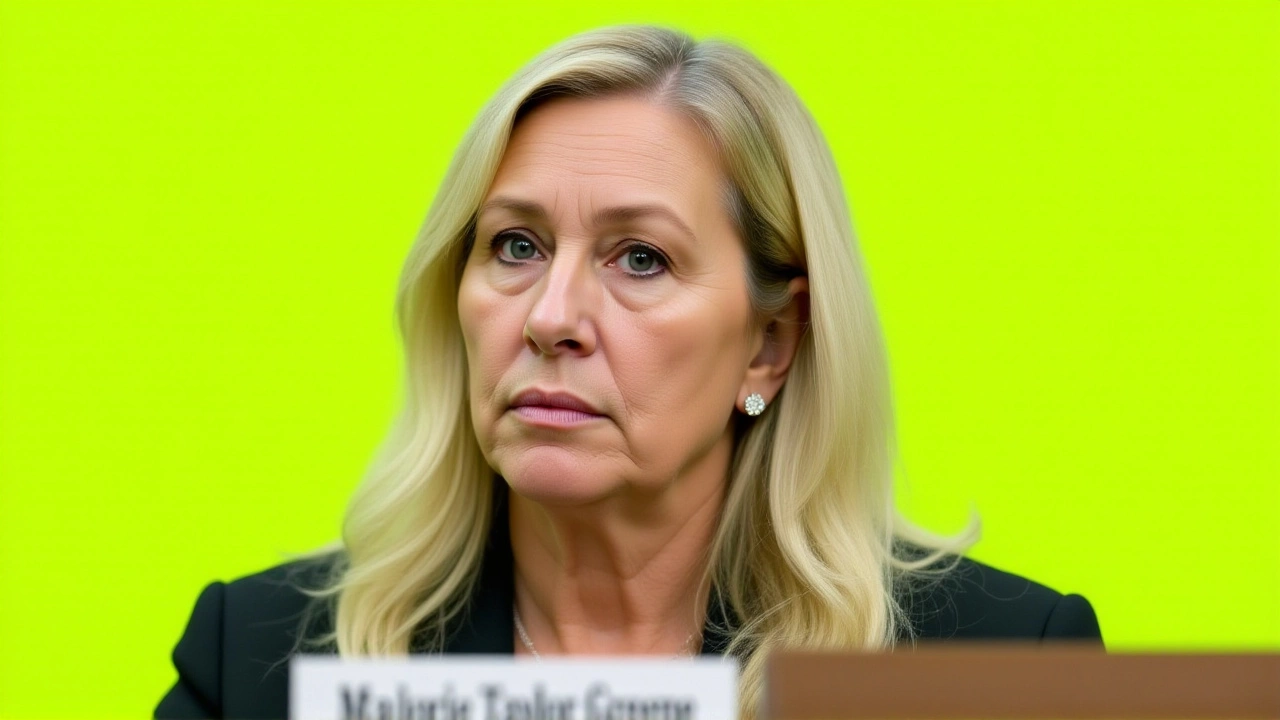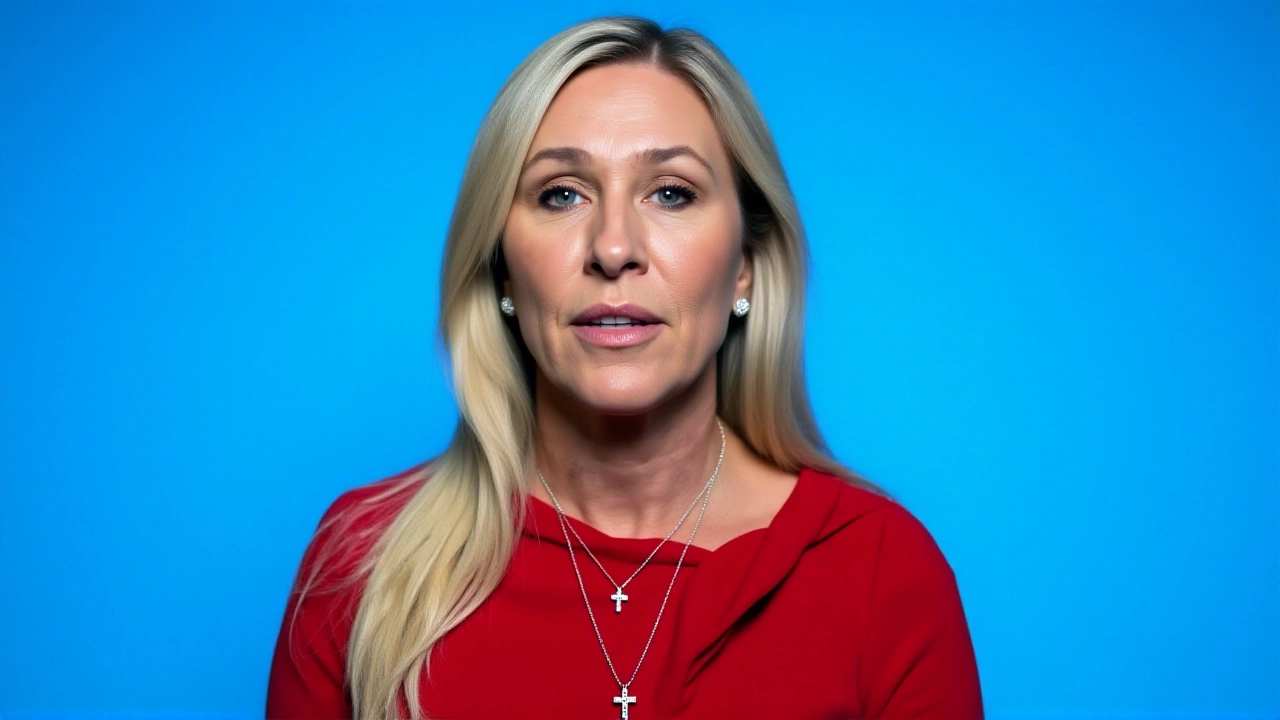On November 22, 2025, Marjorie Taylor Greene, the fiery Republican congresswoman from Georgia, stunned Washington by announcing her resignation from the House of Representatives, effective January 5, 2026. The move, confirmed by ABC News and BBC News, came just one week after Donald Trump publicly withdrew his endorsement and called her a "traitor." The rupture wasn’t over policy disagreements—it was over justice. Greene had demanded the release of sealed documents tied to the Jeffrey Epstein investigation, a case that haunts the American political landscape more than five years after the financier’s death in a Manhattan jail on August 10, 2019.
"I Won’t Be a Battered Wife"
In a four-page statement posted on X (formerly Twitter), Greene didn’t mince words. "Standing up for American women who were raped at 14, trafficked and used by rich powerful men, should not result in me being called a traitor and threatened by the President of the United States, whom I fought for," she wrote. The emotional core of her resignation wasn’t ambition—it was dignity. She described the prospect of a Trump-backed primary challenge as "hurtful and hateful," and said she couldn’t subject her district—or her family—to that kind of public bloodletting. "I have too much self-respect," she added. "And I love my family way too much." In a separate video statement, Greene compared herself to a "battered wife hoping it all goes away and gets better," a searing metaphor that resonated with her base and horrified moderates alike. She didn’t just quit Congress—she quit the game. "No matter which way the political pendulum swings, Republican or Democrat, nothing ever gets better for the common American man or woman," she declared. It wasn’t a farewell. It was a manifesto.Trump’s Cold Response
President Trump didn’t waste time reacting. In a brief phone interview with ABC News Senior Political Correspondent Rachel Scott on the same day, he called Greene’s resignation "great news for the country." He confirmed she hadn’t given him any heads-up. "She did not give me a heads up," Trump said, adding flatly: "I have no plans to speak with her. I wish her well." The dismissal was chilling in its finality. Just weeks earlier, Trump had threatened to fund a primary challenger against Greene in 2026. Now, he didn’t even bother to pretend regret.The rift began around November 15, 2025, when Trump publicly turned on Greene after she pressed the Justice Department to release Epstein-related files—files that, according to her, contained names of powerful men who escaped accountability. She didn’t just want transparency. She wanted retribution. And in Trump’s world, that crossed a line. Greene had been one of his most loyal allies during his presidency (2017–2021) and his 2024 campaign. She spoke at his rallies, defended him on cable news, and helped rally the MAGA base. But loyalty, in Trump’s orbit, is conditional. When she challenged his administration’s silence on Epstein, she became expendable.

The Fallout in Georgia
Greene’s departure leaves a gaping hole in Georgia’s congressional delegation. While her exact district isn’t specified in reports, she’s long represented a heavily Republican stretch of northern Georgia, including parts of Atlanta’s exurbs. Her resignation triggers a special election, though Georgia state law doesn’t yet specify the timeline. Political insiders say the GOP will scramble to find a candidate who can both appease Trump’s loyalists and avoid alienating suburban moderates who’ve grown wary of extremism.Greene’s exit also removes a key voice from the House Freedom Caucus, the hardline conservative bloc that has pushed the GOP further right. Her absence could weaken the far-right’s ability to block compromise bills—or, conversely, it could give more moderate Republicans breathing room to negotiate. Either way, the balance of power shifts. Analysts warn that without Greene’s combative energy, the MAGA movement may lose a potent symbol—someone who turned outrage into electoral power.
What Comes Next?
Greene didn’t say she was done with politics. "When the common American people finally realize... they possess the real power over Washington, then I’ll be here by their side to rebuild it," she wrote. That’s not a retirement. It’s a rebrand. She’s positioning herself as a populist outsider—no longer bound by congressional rules or party loyalty. Could she run for governor? Senate? A third-party bid? She didn’t rule it out. What’s clear is this: she’s not going quiet.Her resignation also raises a broader question: What happens to the MAGA movement when its most visible champions turn on its leader? Greene’s fall is a warning to other Trump allies: speak out, and you might get crushed. But it’s also a testament to her courage—or recklessness, depending on your view. She chose principle over power. And in a political system where survival often means silence, that’s rare.

Why Epstein Still Matters
The Epstein case isn’t just about a dead billionaire. It’s about a system that protected the powerful. The files Greene demanded include names of associates, flight logs, and communications that could implicate politicians, CEOs, and celebrities. Trump’s refusal to release them—despite public pressure—has fueled conspiracy theories and eroded trust. Greene’s fight wasn’t just political; it was moral. And in a country where victims of sexual trafficking are routinely ignored, her stance struck a nerve. Even critics who despised her rhetoric couldn’t deny the gravity of the issue she championed.Frequently Asked Questions
Why did Marjorie Taylor Greene resign over the Epstein files?
Greene resigned because President Trump branded her a "traitor" after she demanded the release of sealed documents related to Jeffrey Epstein’s sex trafficking network. She argued that exposing powerful men who exploited victims was a moral duty—not a betrayal. Trump’s withdrawal of support, coupled with threats of a primary challenge, made her position untenable. She chose to step down rather than endure a divisive, Trump-backed primary that she believed would hurt Republicans in the 2026 midterms.
How will Greene’s resignation affect the 2026 midterm elections?
Greene’s exit removes a polarizing figure from the ballot, potentially reducing voter turnout in her district and making it harder for Democrats to capitalize on GOP infighting. However, it also creates a vacuum that could empower more moderate Republicans—or fuel a far-right insurgency if Trump backs a challenger later. Analysts warn that the special election will serve as a bellwether for MAGA’s staying power without Trump’s direct endorsement.
What’s the significance of Trump calling Greene a "traitor"?
Calling someone a "traitor" in modern American politics is one of the harshest accusations possible—it implies disloyalty to the nation itself. Trump used the term to punish dissent within his movement. For Greene, who built her career on loyalty to Trump, being labeled a traitor wasn’t just political; it was personal. The term shattered her identity as a MAGA loyalist and signaled that even his closest allies are disposable if they cross him.
Will Marjorie Taylor Greene return to politics?
Greene didn’t rule it out. In her resignation statement, she framed her exit as temporary, vowing to "rebuild" the political system alongside "common Americans" when they realize they hold real power. She’s positioning herself as a populist outsider, possibly eyeing a gubernatorial run, a Senate bid, or even an independent campaign. Her influence won’t vanish—she’s already building a grassroots network outside Congress.
How does this affect the House Freedom Caucus?
Greene was one of the most visible and aggressive members of the House Freedom Caucus, known for her hardline tactics and media savvy. Her departure weakens the caucus’s ability to block moderate legislation and may reduce its leverage in negotiations. Without her, the group risks becoming less visible to the public, though other members like Matt Gaetz may try to fill the void—though none have her level of national recognition or willingness to defy Trump.
Why is the Epstein case still politically relevant in 2025?
The Epstein case remains relevant because key documents—flight logs, names of associates, and communications—are still sealed. Victims and investigators believe these files could expose powerful figures who avoided prosecution. Trump’s refusal to release them, even after his return to power, reinforced suspicions that political elites are protecting each other. Greene’s push for transparency made her a symbol for those demanding accountability, turning a criminal investigation into a test of democratic integrity.
